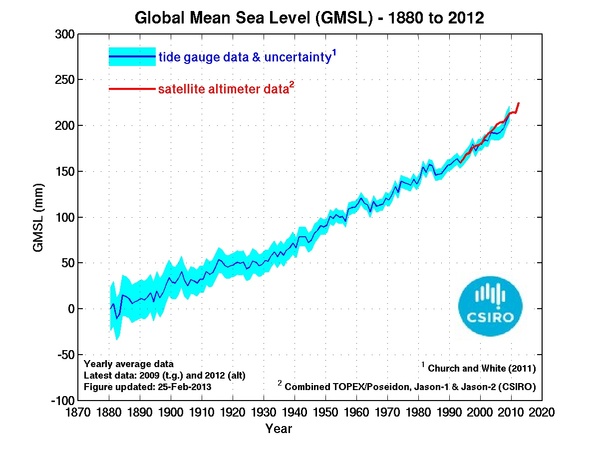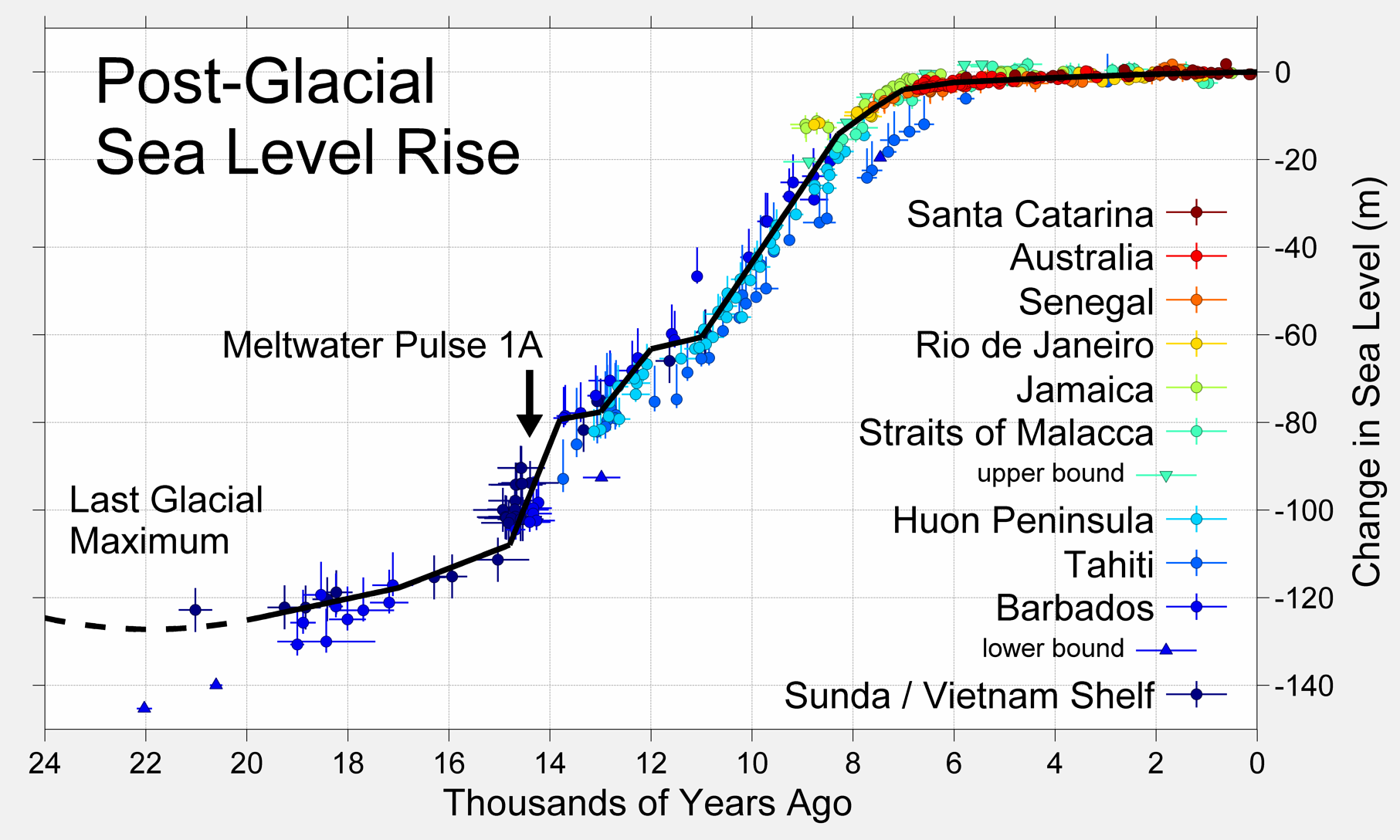I came upon this fascinating article over the weekend: "N. Carolina Senate Decides to Include Science in Sea Level Projections After All." According to this source the North Carolina government has been chastised and ridiculed over the fact that it prohibits “rule, ordinance, policy, or planning guideline that defines sea level
or a rate of sea-level rise within a coastal-area county” that fall
outside of an official state rate of rise, i.e., if you make public policy (law) in North Carolina you must use the state's definition of sea level.
The argument seems to be related to whether or not the sea level will rise 8" or 39" inches in the next 85 years.
No doubt the North Carolina politicians are using figures like this to make their estimates:
As you can see it shows that sea level has risen some 200 or so millimeters over the last hundred and thirty years. In North Carolina somebody in state government took a ruler and drew a line off to the right following the trend of the last one hundred and thirty years and came up with 8" more of sea level rise by 2100.
Then they attempted to make public law that said in effect we're going to work as if this is the case for long range planning, i.e., how far from shore do I put a public highway given a thirty or one hundred year life expectancy for the project.
Being sworn to uphold the laws of the state I am not sure what else should be done.
But others disagree (like those as Ars Technica, Scientific American, and the "Colbert Report").
They believe that due toglobal warming climate change the trend line above is about to go vertical and the sea level will rise by 39" inches in 2100 instead.
So what should a law maker do?
Apparently, at least according to the sources listed above, run around claiming the world is about to end like Chicken Little waving their arms and spend tax payer money on what might happen.
By this reasoning we should be spending public money building bunkers to save us from alien invasions and ghost attacks as well - because, well, they might happen too.
Wikipedia has a nice historical chart on sea level:
You can see from this that, as the glaciers melted at the end of the last ice age, the sea level went up some 120 meters (120,000 mm). Of course, because the line levels out in the last eight thousand years humans tend to think that this must be the "normal" sea level, but I doubt this is the case.
There are many sources that show glaciation is cyclical so one suspects that the sea level varies significantly in a cyclical manner over time as well (source here - assuming that CO2 drives temperature and temperature drives sea level directly):
Unfortunately glaciers and varying sea levels wipe out a lot of direct historical evidence about what's going on in the climate.
Articles like this suggest that in fact glaciers that are receding today were a lot smaller in the last few thousand years.
Other articles suggest that as ice sheets melt in the Arctic the plankton below bloom in the presence of sun and CO2 and change the climate.
(I linked only one for each case above, but there are many more for you to Google.)
So scientists have to guess.
And since we're talking about 120,000 mm of sea level change a 1% error would be 1,200 mm or about 39" inches.
Now last time I checked climate science, weather, and fortune tellers were unlikely to come within an accurate 1% estimate of anything they work on. For example there are many web sites comparing climate science predictions to fact. Most show something like this:
(The small purple dots at the bottom are the actual climate data, the bright green, orange and blue lines are the "predictions." The error here is significantly larger than 1%. And yes, temperature is actually rising but so what? Without knowledge and evidence of the cause its no more significant than temperature falling or staying the same...)
So based on this is it wise to make public policy (and spend tax dollars) on climate science?
Would you want your money spent on what might happen, even at a 5% error rate? (I make up the 5% based on a combination of historical facts: cyclical climate including ice ages, corresponding temperature swings, changes in various geological factors, etc.)
I think the responsible answer is no.
Now in North Carolina I did not see it reported anywhere that the laws in question were for all time and could never be changed based on new evidence. All I saw was a bunch of politicians saying "I'm responsible for public funds and without some kind of actual evidence" I am going with law based on proven past history rather than speculation.
North Carolina's budget appears to run close to break even according to this link - and certainly year-to-year runs within about 10% of even - even given today's economy.
(Imagine, a responsible state government with a balanced budget. Seems like they understanding the concept of estimation and evidence.)
The bottom line here is that believers in climate science dogma want to "shout down" responsible government. But without some shred of evidence that things will change dramatically why would responsible adults do anything but what North Carolina has done.
Certainly aliens might invade, but do I want public funds spent on that today?
What about the Yellowstone volcanic caldera erupting? It might happen surely and, I argue, there is better evidence for this as a threat to humanity than climate change.
However, since this is not tied directly to evil "human activity and fossil fuel" no one cares. But wouldn't a volcanic ash cloud the size of the Louisiana Purchase be a problem?
Yup, I think so...
The argument seems to be related to whether or not the sea level will rise 8" or 39" inches in the next 85 years.
No doubt the North Carolina politicians are using figures like this to make their estimates:
As you can see it shows that sea level has risen some 200 or so millimeters over the last hundred and thirty years. In North Carolina somebody in state government took a ruler and drew a line off to the right following the trend of the last one hundred and thirty years and came up with 8" more of sea level rise by 2100.
Then they attempted to make public law that said in effect we're going to work as if this is the case for long range planning, i.e., how far from shore do I put a public highway given a thirty or one hundred year life expectancy for the project.
Being sworn to uphold the laws of the state I am not sure what else should be done.
But others disagree (like those as Ars Technica, Scientific American, and the "Colbert Report").
They believe that due to
So what should a law maker do?
Apparently, at least according to the sources listed above, run around claiming the world is about to end like Chicken Little waving their arms and spend tax payer money on what might happen.
By this reasoning we should be spending public money building bunkers to save us from alien invasions and ghost attacks as well - because, well, they might happen too.
Wikipedia has a nice historical chart on sea level:
You can see from this that, as the glaciers melted at the end of the last ice age, the sea level went up some 120 meters (120,000 mm). Of course, because the line levels out in the last eight thousand years humans tend to think that this must be the "normal" sea level, but I doubt this is the case.
There are many sources that show glaciation is cyclical so one suspects that the sea level varies significantly in a cyclical manner over time as well (source here - assuming that CO2 drives temperature and temperature drives sea level directly):
Unfortunately glaciers and varying sea levels wipe out a lot of direct historical evidence about what's going on in the climate.
Articles like this suggest that in fact glaciers that are receding today were a lot smaller in the last few thousand years.
Other articles suggest that as ice sheets melt in the Arctic the plankton below bloom in the presence of sun and CO2 and change the climate.
(I linked only one for each case above, but there are many more for you to Google.)
So scientists have to guess.
And since we're talking about 120,000 mm of sea level change a 1% error would be 1,200 mm or about 39" inches.
Now last time I checked climate science, weather, and fortune tellers were unlikely to come within an accurate 1% estimate of anything they work on. For example there are many web sites comparing climate science predictions to fact. Most show something like this:
(The small purple dots at the bottom are the actual climate data, the bright green, orange and blue lines are the "predictions." The error here is significantly larger than 1%. And yes, temperature is actually rising but so what? Without knowledge and evidence of the cause its no more significant than temperature falling or staying the same...)
So based on this is it wise to make public policy (and spend tax dollars) on climate science?
Would you want your money spent on what might happen, even at a 5% error rate? (I make up the 5% based on a combination of historical facts: cyclical climate including ice ages, corresponding temperature swings, changes in various geological factors, etc.)
I think the responsible answer is no.
Now in North Carolina I did not see it reported anywhere that the laws in question were for all time and could never be changed based on new evidence. All I saw was a bunch of politicians saying "I'm responsible for public funds and without some kind of actual evidence" I am going with law based on proven past history rather than speculation.
North Carolina's budget appears to run close to break even according to this link - and certainly year-to-year runs within about 10% of even - even given today's economy.
(Imagine, a responsible state government with a balanced budget. Seems like they understanding the concept of estimation and evidence.)
The bottom line here is that believers in climate science dogma want to "shout down" responsible government. But without some shred of evidence that things will change dramatically why would responsible adults do anything but what North Carolina has done.
Certainly aliens might invade, but do I want public funds spent on that today?
What about the Yellowstone volcanic caldera erupting? It might happen surely and, I argue, there is better evidence for this as a threat to humanity than climate change.
However, since this is not tied directly to evil "human activity and fossil fuel" no one cares. But wouldn't a volcanic ash cloud the size of the Louisiana Purchase be a problem?
Yup, I think so...



No comments:
Post a Comment